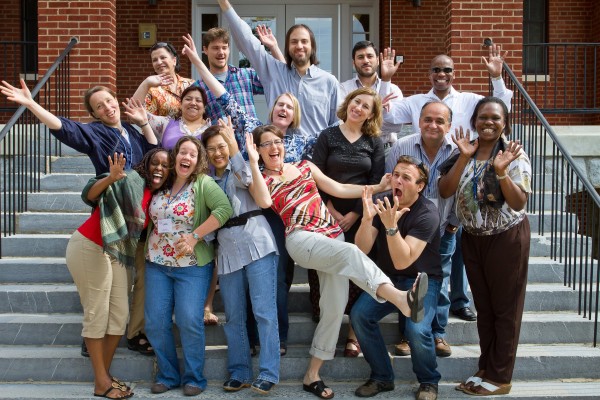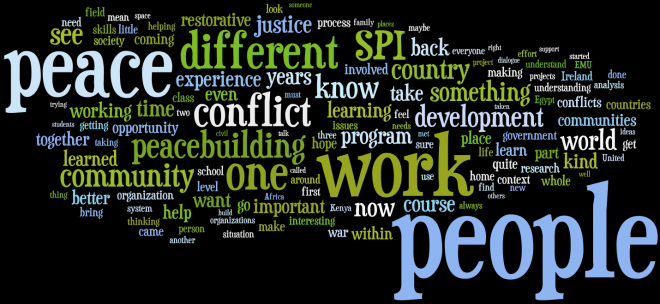
The sixteenth annual Summer Peacebuilding Institute (SPI) at Eastern Mennonite University came to a successful conclusion on June 17th, just over a week ago. During the course of SPI a few of my colleagues conducted sixteen interviews with students and instructors. (To my knowledge, the recurrence of “sixteen” is a happy coincidence.) Our interview subjects hail from nearly ten different countries: from Mexico to Myanmar, Iran to the U.S., and from Darfur to Northern Ireland. The series of questions were designed to elicit a sense for one overall question: What makes SPI so special?
Qualitative research which relies on interviews for data often demands a very long, tedious task: transcription. For these interviews, this job fell to me. I’ve never heard the words “transcribing” and “fun” appear in the same sentence, certainly not from my own experience with a handful of qualitative-style research projects. Though there is an upside to all the starting, stopping, rewinding, replaying, and typing: In my transcribing all the interviews, I started to get a deep sense for why this broad range of people thought SPI was so important. Sixteen people seemed to be saying this…
The Summer Peacebuilding Institute is people working at peacebuilding in a different kind of learning community.
I’ve highlighted words in the previous sentence because they were the ones that showed up at the top of word frequency lists from the transcript data. It illustrates that SPI is about people, work/vocation, peace(building), being different/unique, and learning in community, with the words “people” and “peace(building)” taking particular prominence. During the 2009-’10 academic year, I remember a new textual analysis tool sweeping like wildfire through the CJP student body: Wordle. This is a marvelous little tool for visually reading and interpreting text data. It offers a more appealing way to look at my transcript data:

As a student who has gone through a past SPI, I find myself nodding in agreement when I study this image; it does seem to capture some of what makes SPI such a powerful, unique learning experience. How about you? If you’ve gone through SPI – as a student, an instructor, or both – do these findings resonate? What are some words you might add to the Wordle image? Or, considering my “story” here is kind of boring, do you have any great SPI stories that illustrate how this may be true from your experience? Please feel free to share in the comments below!
 [Brian Gumm is the co-editor of the Peacebuilder Online blog for Eastern Mennonite University’s Center for Justice and Peacebuilding (CJP) and is also a student in EMU’s dual degree program between the CJP and Seminary. He blogs at Restorative Theology on the intersections of theology and peacebuilding from an Anabaptist Christian perspective.]
[Brian Gumm is the co-editor of the Peacebuilder Online blog for Eastern Mennonite University’s Center for Justice and Peacebuilding (CJP) and is also a student in EMU’s dual degree program between the CJP and Seminary. He blogs at Restorative Theology on the intersections of theology and peacebuilding from an Anabaptist Christian perspective.]

It seems very interesting and worth participating. Could you please let me know how to participate?
Thanks for asking, Dhruba! I’ll send you an e-mail as a follow-up but anyone else that’s interested in more information – including enrollment – can check out the SPI website (emu.edu/spi) or the SPI page on Facebook (http://www.facebook.com/summer.peacebuilding.institute).
Dear Brian,
Thank you for your response. I noticed that the SUMMER PEACEBUILDING INSTITUTE: WORKING TOWARD PEACE DIFFERENTLY, IN COMMUNITY has been completed recently. I hope you’ll provide me more information on next year’s program.
Respectfully,
Paudyal